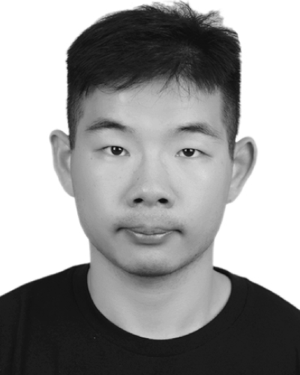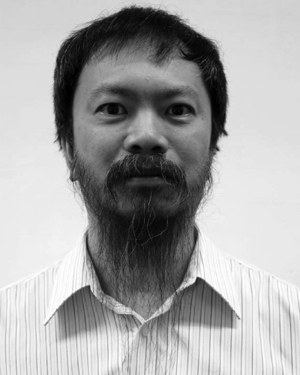Abstract:
We present a method for effectively planning the motion trajectory of robots in manufacturing tasks, the tool paths of which are usually complex and have a large number o...Show MoreMetadata
Abstract:
We present a method for effectively planning the motion trajectory of robots in manufacturing tasks, the tool paths of which are usually complex and have a large number of discrete time constraints as waypoints. Kinematic redundancy also exists in these robotic systems. The jerk of motion is optimized in our trajectory planning method at the meanwhile of fabrication process to improve the quality of fabrication. Our method is based on a sampling strategy and consists of two major parts. After determining an initial path by graph search, a greedy algorithm is adopted to optimize a path by locally applying adaptive filers in the regions with large jerks. The filtered result is obtained by numerical optimization. In order to achieve efficient computation, an adaptive sampling method is developed for learning a collision-indication function that is represented as a support-vector machine. Applications in robot-assisted 3-D printing are given in this article to demonstrate the functionality of our approach. Note to Practitioners-In robot-assisted manufacturing applications, robotic arms are employed to realize the motion of workpieces (or machining tools) specified as a sequence of waypoints with the positions of tool tip and the tool orientations constrained. The required degree of freedom (DOF) is often less than the robotic hardware system (e.g., a robotic arm has six-DOF). Specifically, rotations of the workpiece around the axis of a tool can be arbitrary (see Fig. 1 for an example). By using this redundancy, i.e., there are many possible poses of a robotic arm to realize a given waypoint, the trajectory of robots can be optimized to consider the performance of motion in velocity, acceleration, and jerk in the joint space. In addition, when fabricating complex models, each tool path can have a large amount of waypoints. It is crucial for a motion planning algorithm to compute a smooth and collision-free trajectory of robot to improve the fabrication quality. The time...
Published in: IEEE Transactions on Automation Science and Engineering ( Volume: 17, Issue: 4, October 2020)
Funding Agency:

Department of Design Engineering, Delft University of Technology (TU Delft), Delft, The Netherlands
Department of Mechanical and Automation Engineering, The Chinese University of Hong Kong (CUHK), Hong Kong
Chengkai Dai is currently pursuing the Ph.D. degree with the Department of Sustainable Design Engineering, Delft University of Technology, Delft, The Netherlands.
He worked with the Department of Mechanical and Automation Engineering, The Chinese University of Hong Kong, Hong Kong. His research areas include robotics, geometry computing, and computational design.
Chengkai Dai is currently pursuing the Ph.D. degree with the Department of Sustainable Design Engineering, Delft University of Technology, Delft, The Netherlands.
He worked with the Department of Mechanical and Automation Engineering, The Chinese University of Hong Kong, Hong Kong. His research areas include robotics, geometry computing, and computational design.View more

Inria, Nancy, France
Sylvain Lefebvre was the Principal Investigator of the ERC ShapeForge (StG) and IceXL (PoC) Projects from 2012 to 2017. He created and is the Lead Developer of the IceSL software for modeling for additive manufacturing. He is currently a Senior Researcher at Inria, Nancy, France, where he leads the MFX Team. His main research focus is to simplify content creation by automatically synthesizing highly detailed patterns, str...Show More
Sylvain Lefebvre was the Principal Investigator of the ERC ShapeForge (StG) and IceXL (PoC) Projects from 2012 to 2017. He created and is the Lead Developer of the IceSL software for modeling for additive manufacturing. He is currently a Senior Researcher at Inria, Nancy, France, where he leads the MFX Team. His main research focus is to simplify content creation by automatically synthesizing highly detailed patterns, str...View more

Department of Industrial and System Engineering, The Hong Kong Polytechnic University, Hong Kong
Kai-Ming Yu received the B.Sc. (Eng.) degree in mechanical engineering from The University of Hong Kong, Hong Kong, in 1985, and the Ph.D. degree from the Department of Mechanical Engineering, The University of Hong Kong, in 1991.
He worked with the Research Centre, Mechanical Engineering Department, The Hong Kong University of Science and Technology, Hong Kong, until 1993. He is currently an Assistant Professor with the I...Show More
Kai-Ming Yu received the B.Sc. (Eng.) degree in mechanical engineering from The University of Hong Kong, Hong Kong, in 1985, and the Ph.D. degree from the Department of Mechanical Engineering, The University of Hong Kong, in 1991.
He worked with the Research Centre, Mechanical Engineering Department, The Hong Kong University of Science and Technology, Hong Kong, until 1993. He is currently an Assistant Professor with the I...View more

Department of Design Engineering, Delft University of Technology (TU Delft), Delft, The Netherlands
Jo M. P. Geraedts received the M.Sc. degree from the Eindhoven University of Technology, Eindhoven, The Netherlands, in 1976, and the Ph.D. degree from the University of Nijmegen, Nijmegen, The Netherlands, in 1983, all in physics.
From 1983 to 2017, he was with Océ-van der Grinten, Venlo, The Netherlands. He is currently an Emeritus Professor of New Mechatronic Design with the Delft University of Technology (TU Delft), De...Show More
Jo M. P. Geraedts received the M.Sc. degree from the Eindhoven University of Technology, Eindhoven, The Netherlands, in 1976, and the Ph.D. degree from the University of Nijmegen, Nijmegen, The Netherlands, in 1983, all in physics.
From 1983 to 2017, he was with Océ-van der Grinten, Venlo, The Netherlands. He is currently an Emeritus Professor of New Mechatronic Design with the Delft University of Technology (TU Delft), De...View more

Department of Mechanical and Automation Engineering, The Chinese University of Hong Kong (CUHK), Hong Kong
Charlie C. L. Wang received the Ph.D. degree in mechanical engineering from The Hong Kong University of Science and Technology, Hong Kong, in 2002.
He was a tenured Professor and the Chair of Advanced Manufacturing with the Delft University of Technology (TU Delft), Delft, The Netherlands. He is currently a Professor of Mechanical and Automation Engineering and the Director of the Intelligent Design and Manufacturing Insti...Show More
Charlie C. L. Wang received the Ph.D. degree in mechanical engineering from The Hong Kong University of Science and Technology, Hong Kong, in 2002.
He was a tenured Professor and the Chair of Advanced Manufacturing with the Delft University of Technology (TU Delft), Delft, The Netherlands. He is currently a Professor of Mechanical and Automation Engineering and the Director of the Intelligent Design and Manufacturing Insti...View more

Department of Design Engineering, Delft University of Technology (TU Delft), Delft, The Netherlands
Department of Mechanical and Automation Engineering, The Chinese University of Hong Kong (CUHK), Hong Kong
Chengkai Dai is currently pursuing the Ph.D. degree with the Department of Sustainable Design Engineering, Delft University of Technology, Delft, The Netherlands.
He worked with the Department of Mechanical and Automation Engineering, The Chinese University of Hong Kong, Hong Kong. His research areas include robotics, geometry computing, and computational design.
Chengkai Dai is currently pursuing the Ph.D. degree with the Department of Sustainable Design Engineering, Delft University of Technology, Delft, The Netherlands.
He worked with the Department of Mechanical and Automation Engineering, The Chinese University of Hong Kong, Hong Kong. His research areas include robotics, geometry computing, and computational design.View more

Inria, Nancy, France
Sylvain Lefebvre was the Principal Investigator of the ERC ShapeForge (StG) and IceXL (PoC) Projects from 2012 to 2017. He created and is the Lead Developer of the IceSL software for modeling for additive manufacturing. He is currently a Senior Researcher at Inria, Nancy, France, where he leads the MFX Team. His main research focus is to simplify content creation by automatically synthesizing highly detailed patterns, structures and shapes, with applications in computer graphics and additive manufacturing.
Dr. Lefebvre received the Eurographics Young Researcher Award in 2010.
Sylvain Lefebvre was the Principal Investigator of the ERC ShapeForge (StG) and IceXL (PoC) Projects from 2012 to 2017. He created and is the Lead Developer of the IceSL software for modeling for additive manufacturing. He is currently a Senior Researcher at Inria, Nancy, France, where he leads the MFX Team. His main research focus is to simplify content creation by automatically synthesizing highly detailed patterns, structures and shapes, with applications in computer graphics and additive manufacturing.
Dr. Lefebvre received the Eurographics Young Researcher Award in 2010.View more

Department of Industrial and System Engineering, The Hong Kong Polytechnic University, Hong Kong
Kai-Ming Yu received the B.Sc. (Eng.) degree in mechanical engineering from The University of Hong Kong, Hong Kong, in 1985, and the Ph.D. degree from the Department of Mechanical Engineering, The University of Hong Kong, in 1991.
He worked with the Research Centre, Mechanical Engineering Department, The Hong Kong University of Science and Technology, Hong Kong, until 1993. He is currently an Assistant Professor with the Industrial and Systems Engineering Department, The Hong Kong Polytechnic University, Hong Kong. His research interests include computer-aided design/computer-aided manufacturing (CAD/CAM), computer-aided engineering (CAE), and product data management (PDM), reverse engineering, and rapid prototyping technologies.
Dr. Yu is also a Senior Member of the Society of Manufacturing Engineers.
Kai-Ming Yu received the B.Sc. (Eng.) degree in mechanical engineering from The University of Hong Kong, Hong Kong, in 1985, and the Ph.D. degree from the Department of Mechanical Engineering, The University of Hong Kong, in 1991.
He worked with the Research Centre, Mechanical Engineering Department, The Hong Kong University of Science and Technology, Hong Kong, until 1993. He is currently an Assistant Professor with the Industrial and Systems Engineering Department, The Hong Kong Polytechnic University, Hong Kong. His research interests include computer-aided design/computer-aided manufacturing (CAD/CAM), computer-aided engineering (CAE), and product data management (PDM), reverse engineering, and rapid prototyping technologies.
Dr. Yu is also a Senior Member of the Society of Manufacturing Engineers.View more

Department of Design Engineering, Delft University of Technology (TU Delft), Delft, The Netherlands
Jo M. P. Geraedts received the M.Sc. degree from the Eindhoven University of Technology, Eindhoven, The Netherlands, in 1976, and the Ph.D. degree from the University of Nijmegen, Nijmegen, The Netherlands, in 1983, all in physics.
From 1983 to 2017, he was with Océ-van der Grinten, Venlo, The Netherlands. He is currently an Emeritus Professor of New Mechatronic Design with the Delft University of Technology (TU Delft), Delft, The Netherlands. His research areas include 3-D scanning, 3-D printing, and human–robot interaction.
Jo M. P. Geraedts received the M.Sc. degree from the Eindhoven University of Technology, Eindhoven, The Netherlands, in 1976, and the Ph.D. degree from the University of Nijmegen, Nijmegen, The Netherlands, in 1983, all in physics.
From 1983 to 2017, he was with Océ-van der Grinten, Venlo, The Netherlands. He is currently an Emeritus Professor of New Mechatronic Design with the Delft University of Technology (TU Delft), Delft, The Netherlands. His research areas include 3-D scanning, 3-D printing, and human–robot interaction.View more

Department of Mechanical and Automation Engineering, The Chinese University of Hong Kong (CUHK), Hong Kong
Charlie C. L. Wang received the Ph.D. degree in mechanical engineering from The Hong Kong University of Science and Technology, Hong Kong, in 2002.
He was a tenured Professor and the Chair of Advanced Manufacturing with the Delft University of Technology (TU Delft), Delft, The Netherlands. He is currently a Professor of Mechanical and Automation Engineering and the Director of the Intelligent Design and Manufacturing Institute, The Chinese University of Hong Kong (CUHK), Hong Kong. His research areas include geometric computing, intelligent design, and advanced manufacturing.
Dr. Wang is also a fellow of the American Society of Mechanical Engineers (ASME) and The Hong Kong Institute of Engineers (HKIE).
Charlie C. L. Wang received the Ph.D. degree in mechanical engineering from The Hong Kong University of Science and Technology, Hong Kong, in 2002.
He was a tenured Professor and the Chair of Advanced Manufacturing with the Delft University of Technology (TU Delft), Delft, The Netherlands. He is currently a Professor of Mechanical and Automation Engineering and the Director of the Intelligent Design and Manufacturing Institute, The Chinese University of Hong Kong (CUHK), Hong Kong. His research areas include geometric computing, intelligent design, and advanced manufacturing.
Dr. Wang is also a fellow of the American Society of Mechanical Engineers (ASME) and The Hong Kong Institute of Engineers (HKIE).View more


